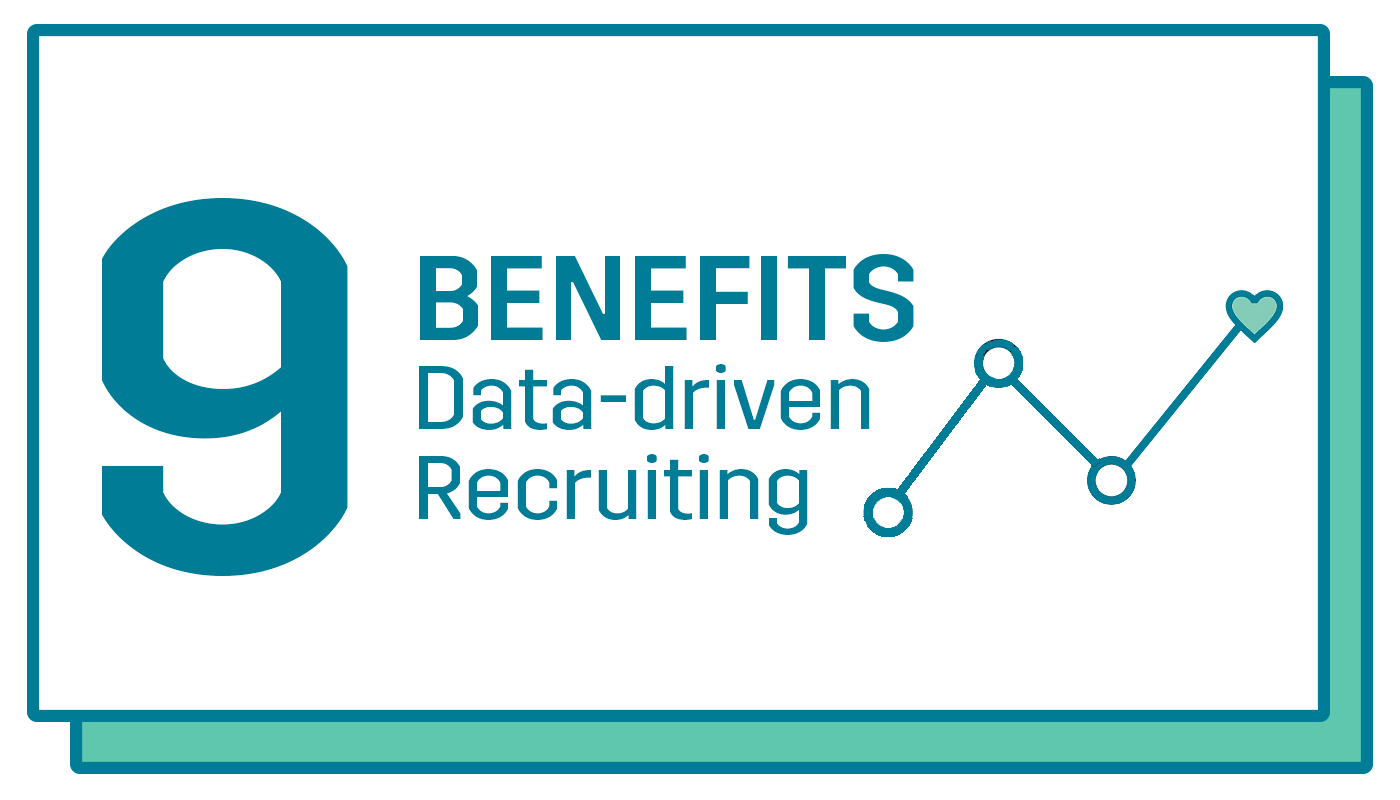
Olle Zander
Marketing Manager at Trustcruit
9 Benefits of Working With Data-Driven Recruiting
Why Your Candidate Experience Need Insights Based on Data
2 out of 3 recruiters have none of or the wrong tools to understand their candidates and the market they recruit from. The reason? They base recruiting on gut feeling and need to start making data-driven decisions.
Why?
Because data-driven recruiting and the use of HR analytics can help you and your organization be 2 times more likely to improve your recruitment performance and 3 times more likely to make cost savings (LinkedIn Talent Solutions).
But what is really data-driven recruiting and how can it help you? This article will take you through all of this, so you safely can say that your candidate experience should become data-driven.
What is data-driven recruiting?
Data-driven recruiting involve all technologies and techniques used to analyze your candidates and the skills and knowledge they have, which helps your organization and recruiters to achieve goals and hire the right people (Florida Institute of Technology).
9 Reasons Why Your Recruiting Should Be Data-Driven
- Remove Decisions Based on Gut Feeling and Human Bias
- Know What to Prioritize and Where to Focus
- Increase the Quality of Candidates Applying
- Benchmark and Forecast Your Recruitment Performance
- Gain Insights to Improve the Recruitment Process
- Decrease the Length of Your Recruitment Process
- Set Objectives and See Performance to Get Proof You Make a Good Job
- Spend Your Budget Right and Make Cost Savings
- Earn Promoters of Your Employer Brand
1. Remove Decisions Based on Gut Feeling and Human Bias
Assuming what decisions to make and base them on gut feeling can almost be compared to rolling dice and rather hurt you more than help. In other words, you take huge risks, which can put a good recruitment process and candidate experience at risk.
What data-driven recruiting does is with the help of data and information you can get insights at your fingertips about e.g. if applicants receive many technical errors or if there are communication touchpoints missing.
But most important of all, during the actual recruitment process, fewer people will be hired because they are likable as a person and will instead be hired because they are good at the job you hire them to do.
2. Know What to Prioritize and Where to Focus
Knowing what decisions to make will also free up your schedule as you now know what to prioritize and not prioritize.
This will likely save you time and also improve the quality of your work as you can focus on what is really important and base these priorities on the feedback from your candidates.
Maybe you can free up even more of your time if you find out that some tasks of the recruitment process can be automated. And remove others that are less relevant for the candidate experience.
3. Increase the Quality of Candidates Applying
Receiving a high number of applying candidates is great, but it will also be harder to determine the quality of all applicants.
Data-driven recruiting can let you pinpoint and filter out candidates with specific skills, but most important of all. Once you have data insights about your recruitment process, you can also make improvements to it and your candidate experience.
This will likely improve the attractiveness of you as an employer and thus increase the quality of candidates applying.
4. Benchmark and Forecast Your Recruitment Performance
Predicting your performance can be very important in terms of what budget you need for the coming period, and maybe even more important how many people you need to recruit into your organization.
This gives you the ability to plan for the future easily and also give a valid reason to managers who decide your budget.
If you are also using an HR analytics tool, which lets you benchmark your performance, you can compare your performance to them. This is a great measure to know whether your organization needs to amplify your recruitment or if you are one of the best.
5. Gain Insights to Improve the Recruitment Process
Knowing what your candidates really think about you and your recruitment can be valuable as you will be able to make improvements based on the insights you get directly from candidates.
Insights as if your candidates enjoyed your recruitment process if they found the recruiter professional, or if rejected candidates are willing to apply again to your organization will be a good source of information.
And insights that you can act and improve on together with your team or department.
6. Decrease the Length of Your Recruitment Process
A lengthy recruitment process can be devastating as your candidates one after another may drop out or even get hired by a competitor of yours while you focus on the wrong stuff.
Knowing your numbers will let you determine the length of your recruitment process – from the moment a candidate has applied for a job until they sign the contract. And also let you keep valuable candidates that you might end up hiring.
A data-driven recruiting approach lets you determine what steps of the recruitment process that take a long time. Can those steps be shortened? Automated? Or even removed?
7. Set Objectives and See Performance to Get Proof You Make a Good Job
Once you know how you perform, you can also set objectives and goals to work towards. Having goals will make your team able to know what you expect from them and something to reach together. And of course, celebrate if you reach them 🎉.
Seeing your performance will give a clear picture if you really do make a good job and what you excel at. As well as the upsides you will also see the downsides. This should not be seen as something negative. You will only get closer to get rid of your flaws and become even better.
8. Spend Your Budget Right and Make Cost Savings
Spending your budget right and making cost savings will make your manager more than happy. In fact, happy candidates and a strong brand can help you reduce hiring costs by 43%.
Data-driven recruiting let you monitor and understand what parts of the recruitment process most of your resources are spent on and whether these resources are spent well.
This lets you reallocate your spendings and voíla you suddenly maybe have an extra budget to spend on promoting your job ads or a new ATS software.
9. Earn Promoters of Your Employer Brand
A strong employer brand must be every recruiter’s or HR manager’s big dream. It will feel like getting top candidates served on a silver platter.
Being data-driven and collecting feedback from your candidates will let you know their likes and dislikes, so you can create a good candidate experience for them.
A good candidate experience will result in happy candidates and generate ambassadors for your employer brand who will spread the word about how great your recruitment process is and recommend you to friends, family, and colleagues.
This is best measured using the key metric Candidate Net Promoter Score (CNPS), which gives you a score of how likely your candidates are ambassadors of your employer brand.

How to Make Your Recruiting Data-Driven?
Now you are aware of all the great benefits of having a data-driven recruiting. As that both time and money can be spent better, that you can measure and benchmark performance, and create ambassadors of your employer brand.
But the questions still remain – How can I start with data-driven recruiting? And how do I make data-driven decisions?
Don’t worry, we have an article for that: How to Make Data-Driven Decisions When Recruiting?
Good luck with becoming data-driven. If you have any comments or questions, please contact us in the chat (bottom right corner).
Get notified on new blog updates
+ get our popular candidate experience ebook for free